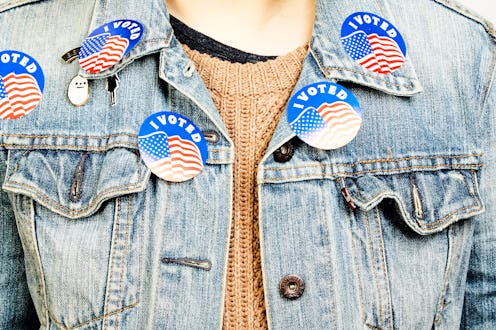Life
Why Do We Use The Electoral College?

When I started getting old enough to better understand politics and the way elections work, there was one thing I kept hearing that left me scratching my head: "Our votes don't count." I learned that what people were referring to was a matter of the electoral college — which, in turn, prompted me to ask, why do we use the electoral college rather than the popular vote to choose a president? A new video from Daven Hisky of the YouTube Channel Today I Found Out answers these questions and more. After all, in a culture where we're constantly encouraged to vote, the idea that our votes don't count seems more than a little contradictory — and if anything has become clear during the 2016 election cycle, it's that our votes very much do matter. They matter a lot. Seriously, you guys. Make sure you get out there and vote this year. The stakes have never been higher.
Let's start by taking a look at the differences between the popular vote and the electoral college. To begin, a popular vote for a president is made by a qualified voter, like you or me. Easy peasy. The electoral college, however, is more complicated. The electoral college (which, by the way, is a process, not a place) is the meeting of a group of electors who vote for the president. Our founding fathers established this process in the Constitution as a compromise between Congress voting and citizens voting, attempting to strike a balance between the two.
There's a whole lot more to it than this, a lot of which Hisky goes into detail on. You can watch the full video below for the big picture:
Now, on to the million dollar question: Why do we use the electoral college as the means to pick the president? Here's a breakdown of what Hisky had to say:
Back In The Day, The States Weren't Nearly As Cohesively Bound As They Are Today
In 1787, our country only consisted of 13 states, and residents identified more as citizens of their state as opposed to citizens of the nation. There was a concern that they'd automatically vote for candidates of their own state because they likely wouldn't even know about any other candidates.
One option introduced, the popular vote, was a problem because larger states like Virginia would have a disproportionately large say in votes. The other option was a congressional appointment, which was inherently non-Democratic, because there was an opinion that the president should be dependent on Congress and less powerful.
The compromise was the electoral vote.
The General Public Wasn't At All Well-Informed About The Various Candidates
Members of Congress, however, were highly qualified to pick the best president. In theory, this sounded like the best approach. Regardless, the process involved was a potential breeding ground of corruption. This was another reason the electoral college was proposed.
The Electoral College Gave Extra Votes To Smaller States
This process slightly improved the problems of larger states having greater influence by awarding smaller states extra votes through an electoral for each of their senatorial representatives.
The Electoral College Specified The Election Of The VP
These days, the president chooses his or her vice president. But around the election of 1800, each elector would cast two votes: One for one candidate, and one for a second. The person with the second greatest number of votes became the vice president — a process that introduced a number of problems.
So there you have it! Whether or not we should continue to use the electoral college today is up for debate — there are compelling arguments on both sides — but, well... it's what we've got to work with for now.
Remember when I said everyone needed to get out there and vote? I mean it. It's a privilege to be able to do so. The fate of the country literally lies in our hands.
Images: Hannah Burton for Bustle; Today I Found Out/YouTube (4)